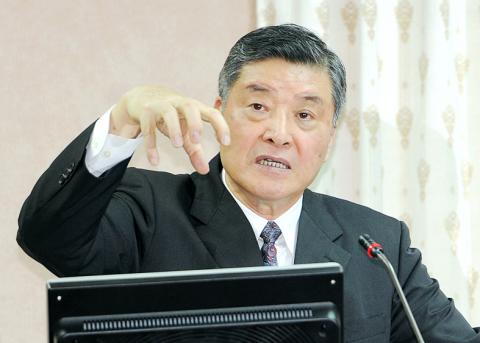Minister of National Defense Kao Hua-chu (高華柱) apologized yesterday for the crashes of two air force fighter jets within five days of each other earlier this month, but added that pilots need public support to regain their confidence as soon as possible.
Kao was responding to questions from lawmakers about the availability of the nation’s air arsenal after the crashes of an F-16 and a Mirage 2000-5.
“I’m more than willing to offer an apology to the public for the mishaps and will assume full political responsibility for them,” Kao told lawmakers.

Photo: Liao Chen-huei, Taipei Times
He said the most important thing is to ascertain the cause of the crashes.
“Special task forces have been formed to investigate each crash,” Kao said, adding that the early signs show mechanical failure to be the most likely cause of the accidents.
On May 15, a single-seater F-16 of the 455th Tactical Fighter Wing crashed into waters southwest of Chiayi. Its 26-year-old pilot managed to eject to safety.
The other incident involved a twin-seater Mirage 2000-5 belonging to the 499th Tactical Fighter Wing based in Hsinchu, which crashed off the western coast shortly after takeoff on May 20. Again, its two pilots were able to bail out safely.
Despite the crashes, Kao assured lawmakers that all Air Force aircraft on active duty are in good and serviceable condition.
“The availability rate of our air arsenal for active service meets the nation’s requirements,” Kao said.
US-built F-16s, French-made Mirage 2000-5s and locally developed Ching-kuo IDF jets form the backbone of the nation’s air defenses.
Asked about progress of the military’s plan to procure new warplanes that would constitute a third generation of aircraft for the Air Force, Kao said the procurement of US-built F-35 jets is a long-term target.
“Before this goal is realized, we have other projects to complete to meet our defense needs,” Kao said.
Previous media reports have said Taiwan is looking to buy an F-35 variant with short takeoff and vertical-land capabilities.

Taiwan is stepping up plans to create self-sufficient supply chains for combat drones and increase foreign orders from the US to counter China’s numerical superiority, a defense official said on Saturday. Commenting on condition of anonymity, the official said the nation’s armed forces are in agreement with US Admiral Samuel Paparo’s assessment that Taiwan’s military must be prepared to turn the nation’s waters into a “hellscape” for the Chinese People’s Liberation Army (PLA). Paparo, the commander of the US Indo-Pacific Command, reiterated the concept during a Congressional hearing in Washington on Wednesday. He first coined the term in a security conference last

DEFENSE: The National Security Bureau promised to expand communication and intelligence cooperation with global partners and enhance its strategic analytical skills China has not only increased military exercises and “gray zone” tactics against Taiwan this year, but also continues to recruit military personnel for espionage, the National Security Bureau (NSB) said yesterday in a report to the Legislative Yuan. The bureau submitted the report ahead of NSB Director-General Tsai Ming-yen’s (蔡明彥) appearance before the Foreign and National Defense Committee today. Last year, the Chinese People’s Liberation Army (PLA) conducted “Joint Sword-2024A and B” military exercises targeting Taiwan and carried out 40 combat readiness patrols, the bureau said. In addition, Chinese military aircraft entered Taiwan’s airspace 3,070 times last year, up about

A magnitude 4.3 earthquake struck eastern Taiwan's Hualien County at 8:31am today, according to the Central Weather Administration (CWA). The epicenter of the temblor was located in Hualien County, about 70.3 kilometers south southwest of Hualien County Hall, at a depth of 23.2km, according to the administration. There were no immediate reports of damage resulting from the quake. The earthquake's intensity, which gauges the actual effect of a temblor, was highest in Taitung County, where it measured 3 on Taiwan's 7-tier intensity scale. The quake also measured an intensity of 2 in Hualien and Nantou counties, the CWA said.

The Overseas Community Affairs Council (OCAC) yesterday announced a fundraising campaign to support survivors of the magnitude 7.7 earthquake that struck Myanmar on March 28, with two prayer events scheduled in Taipei and Taichung later this week. “While initial rescue operations have concluded [in Myanmar], many survivors are now facing increasingly difficult living conditions,” OCAC Minister Hsu Chia-ching (徐佳青) told a news conference in Taipei. The fundraising campaign, which runs through May 31, is focused on supporting the reconstruction of damaged overseas compatriot schools, assisting students from Myanmar in Taiwan, and providing essential items, such as drinking water, food and medical supplies,